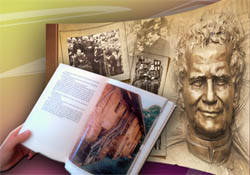

(ANS – Rome) – Just a few days before the beginning of three years of preparation for the Bicentenary of the birth of Don Bosco, ANS asked Don Francesco Motto, Director of the Salesian Historical Institute, to suggest how we can learn more about this saint from Turin.
Understanding Don Bosco is a subject dear to the heart of the Rector Major, Don Pascual Chávez. Taken up in the first theme of the 26th General Chapter – Return to Don Bosco – it was put forward again to Salesians in his letter of 31 January 2011, in which he outlined the journey of preparation for 2015: a knowledge of Don Bosco’s life story, his educational method and his spirituality.
Don Motto’s suggestions – available in the Service section of ANS – are not limited to the mere knowledge of the historical data and, as outlined by the the Rector Major, include consideration of the educational and spiritual context.
The Salesian historian starts from the simple question: ‘Which Don Bosco?’ - "given that there are dozens of images of Don Bosco in books, reviews, journals, videos, film and fiction." He quotes the remark of Don Chávez’s in the Strenna for 2012: "Our approach to Don Bosco, using appropriate methods of historical research, has led us to better understand and assess his human and Christian greatness, his practical brilliance, his skills as an educator, his spirituality and his work, which are fully understood only if deeply rooted in the history of the society in which he lived."
For Don Motto there are three stages in getting to know Don Bosco better:
Don Motto ended by explaining that "When he has understood, indicated and explained the context, the events, the causes and the consequences, the historian has completed his task. To his ‘historical’ interpretation there needs to be added the ‘existential’."
Published 12/8/2011
